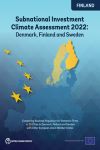Overview
Subnational Investment Climate Assessment 2022: Denmark, Finland and Sweden assesses the regulatory environment for businesses and its impact on local entrepreneurs in 6 cities in Denmark (Aalborg, Aarhus, Copenhagen, Kolding, Naestved and Odense), 6 cities in Finland (Helsinki, Mariehamn, Oulu, Tampere, Turku and Vaasa) and 8 cities in Sweden (Gävle, Göteborg, Jönköping, Malmö, Stockholm, Sundsvall, Umeå and Uppsala). The study measures regulations relevant to five stages in the life of a small to medium-size domestic firm: business start-up, building permits, electricity connection and supply, property transfer, and commercial litigation. In each of these areas, the study highlights good practices that can be leveraged to empower local entrepreneurs and firms.
Doing Business in the European Union is a series of subnational studies requested and funded by the European Commission, Directorate-General for Regional and Urban Policy, and produced by the World Bank Group. Previous editions, covering cities from Austria, Belgium, Bulgaria, Croatia, the Czech Republic, Greece, Hungary, Ireland, Italy, the Netherlands, Portugal, Romania, and Slovakia, were released in 2017-2021.
Where is it easier to do business in Finland?
Main findings
- Finland shows significant subnational performance gaps. Even the five mainland cities benchmarked in this study show disparities in regulatory performance, especially in the areas related to building permits, electricity connection, and commercial litigation. Variations in regulatory performance are even more pronounced when comparing Mariehamn—the capital of the autonomous region of Åland—with the rest of the country. This is mainly driven by differences in performance for business start-up and property transfer.
- No city is the top performer across all indicators. Vaasa is the only city that scores among the top three locations in all benchmarked areas; all the others score in the top half in at least one area and the bottom half in another. Mariehamn has the highest score for building permits and electricity connection but the lowest for business start-up and property transfer. Tampere and Oulu rank first on property transfer, while Tampere ranks fifth on building permits. This uneven performance across indicators points to opportunities for Finnish cities to learn from each other’s good practices.
- Business start-up is the only area where no Finnish city scores above the EU average. Although starting up a business is less expensive and requires fewer procedural steps in Finland, Finnish entrepreneurs spend more time completing these steps than in the European Union as a whole. Electricity connection is the one area where all six Finnish cities perform above the EU average. Utilities in Finland connect their customers in less time and with lower costs and the electricity supply is among the most reliable in the European Union.
- Time is the main source of variation in performance among the Finnish cities benchmarked. The time it takes to comply with bureaucratic requirements varies significantly depending on where Finnish entrepreneurs establish their business. Entrepreneurs in Oulu spend the least time complying with bureaucratic requirements in the five regulatory areas benchmarked—seven months less than their peers in Helsinki.
- Finnish cities have opportunities to share good practices to improve the business environment, especially in building permits, electricity connection, and commercial litigation. In business start-up and property transfer, good practices in other economies could encourage Finland to be more ambitious in the modernization of their regulatory framework.

